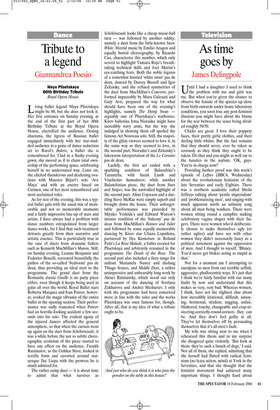Tribute to a legend
Giannandrea Poesio
Maya Plisetskaya 80th Birthday Tribute Royal Opera House
Living ballet legend Maya Plisetskaya might be 80, but she does not look it. Her first entrance on Sunday evening, at the end of the first part of her 80th Birthday Tribute at the Royal Opera House, electrified the audience. Oozing charisma, the tigress of Russian ballet engaged immediately with her star-studded audience in a game of dance seduction set to Ravel’s Bolero, a ballet she is remembered for. Clad in a flashy evening gown, she moved as if to claim total ownership of the performing space, celebrating herself in no understated way. Later on, she elicited thunderous and deafening ovations with Maurice Béjart’s solo ‘Ave Maya’ and with an encore based on Carmen, one of her most remembered and most acclaimed roles.
As for rest of the evening, this was a typical ballet gala with the usual mix of memorable and not so memorable moments and a fairly impressive line-up of stars and artists. I have always had a problem with dance numbers extrapolated from larger dance works, for I find that such treatment detracts greatly from their narrative and artistic essence. This is particularly true in the case of duets from dramatic ballets such as Kenneth MacMillan’s Manon. Still, on Sunday evening, Leanne Benjamin and Federico Bonelli, recreated beautifully the pathos of the so-called ‘bedroom’ pas de deux, thus providing an ideal start to the programme. The grand duet from the Romantic classic Giselle is no party piece either, even though it keeps being used in galas all over the world. Royal Ballet stars Roberta Marquez and Ivan Putrov, however, evoked the magic vibrancy of the entire ballet in the opening section. Their performance was sadly truncated when Putrov had an horrific-looking accident a few seconds into his solo. The evident agony of the injured dancer affected the general atmosphere, so that when the curtain went up again on the duet from Schéhérazade, it was a while before the not so subtle choreographic eroticism of the piece started to have any effect on the audience. Farukh Ruzimatov, as the Golden Slave, looked in terrific form and cavorted around statuesque Ilse Liepa with the prowess he is much admired for.
The rather camp duet — it is about time to admit that what survives as Schéhérazade looks like a cheap music-hall turn — was followed by another oddity, namely a duet from the little-known Snow White. Horrid music by Emilio Aragon and equally horrid choreography, by Ricardo Cue, characterise this number, which only served to highlight Tamara Rojo’s breathtaking technical skills and José Martin’s eye-catching feats. Both the noble legatos of a somewhat hurried ‘white swan’ pas de deux, danced by Darcey Bussell and Igor Zelensky, and the refined symmetries of the duet from MacMillan’s Concerto, performed impeccably by Mara Galeazzi and Gary Avis, prepared the way for what should have been one of the evening’s highlights, namely The Dying Swan arguably one of Plisetskaya’s warhorses. Kirov ballerina Irma Nioradze might have incredibly wavy arms, but the way she indulged in showing them off spoiled the famous Art Nouveau solo. Still, the majority of the glitzy viewers seemed to love it, in the same way as they seemed to love, in the second part, Nioradze’s and Zelensky’s lukewarm interpretation of the Le Corsaire pas de deux.
Luckily, the first act ended with a sparkling rendition of Balanchine’s Tarantella, with Sarah Lamb and Viacheslav Samodurov, while another Balanchinian piece, the duet from Stars and Stripes, was the unrivalled highlight of the second part. Alina Cojocaru and a dazzling Steve McRae were simply superb and brought down the house. Their unforgettable performance was preceded by Miyako Yoshida’s and Edward Watson’s intense rendition of the ‘balcony’ pas de deux from MacMillan’s Romeo and Juliet and followed by some equally memorable dancing by Kirov star Uliana Lopatkina, partnered by Ilya Kusnetsov in Roland Petit’s La Rose Malade, a ballet created for Plisetskaya and arbitrarily renamed in the programme The Death of the Rose. The second part also included a fiery tango for radiant Marianela Nunez and dashing Thiago Soares, and Middle Duet, a rather unimpressive and unbearably long work by Alexei Ratmansky, which stood out only on account of the dancing of Svetlana Zakharova and Andrei Merkuriev. I only wish the programme had been conceived more in line with the roles and the works Plisetskaya was once famous for, though. After all, that is my idea of what a tribute ought to be.


















































































 Previous page
Previous page